
fastllm
纯c++的全平台llm加速库,支持python调用,chatglm-6B级模型单卡可达10000+token / s,支持glm, llama, moss基座,手机端流畅运行
Stars: 3446
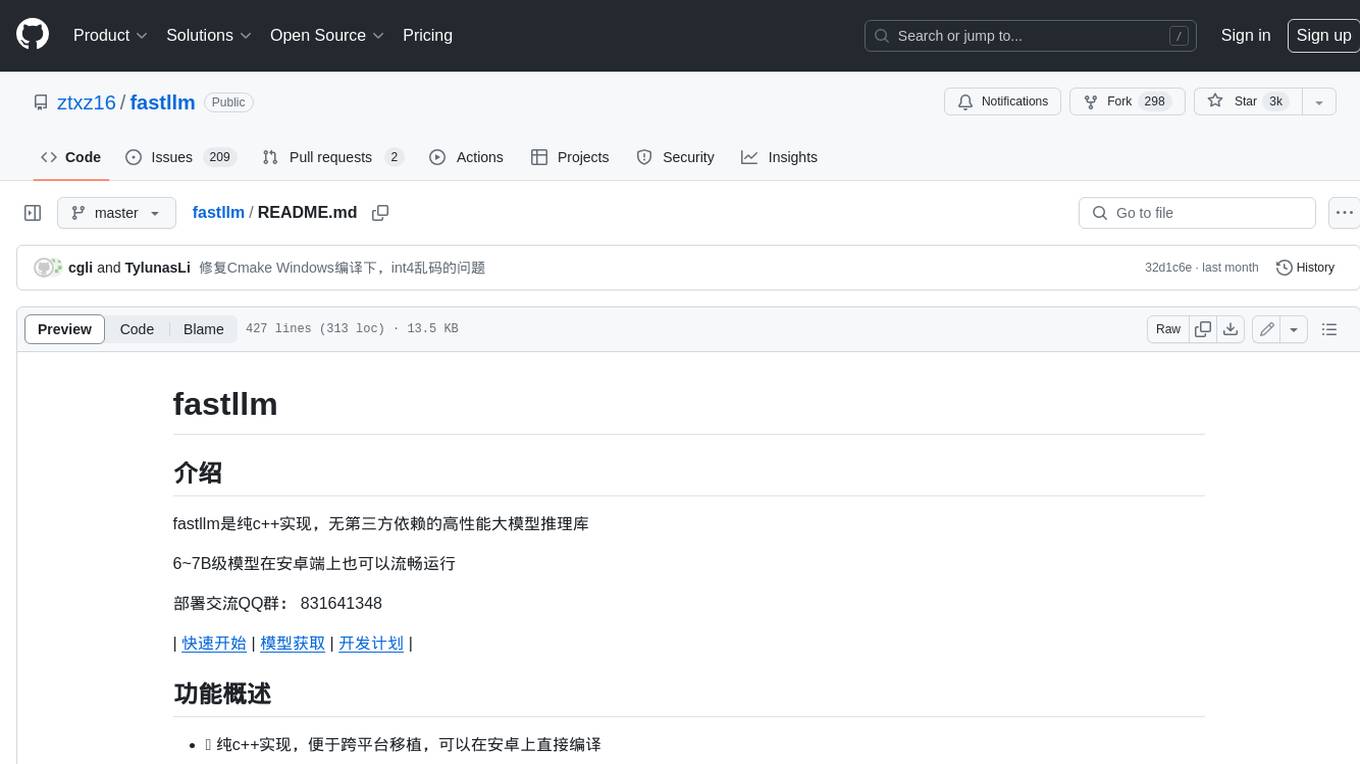
FastLLM is a high-performance large model inference library implemented in pure C++ with no third-party dependencies. Models of 6-7B size can run smoothly on Android devices. Deployment communication QQ group: 831641348
README:
fastllm是纯c++实现,无第三方依赖的多平台高性能大模型推理库
部署交流QQ群: 831641348
- 🚀 纯c++实现,便于跨平台移植,可以在安卓上直接编译
- 🚀 无论ARM平台,X86平台,NVIDIA平台,速度都较快
- 🚀 支持读取Hugging face原始模型并直接量化
- 🚀 支持部署Openai api server
- 🚀 支持多卡部署,支持GPU + CPU混合部署
- 🚀 支持动态Batch,流式输出
- 🚀 前后端分离设计,便于支持新的计算设备
- 🚀 目前支持ChatGLM系列模型,Qwen系列模型,各种LLAMA模型(ALPACA, VICUNA等),BAICHUAN模型,MOSS模型,MINICPM模型等
- 🚀 支持Moe模型的cpu-cuda混合部署
- 🚀 支持Python自定义模型结构
建议使用cmake编译,需要提前安装gcc,g++ (建议9.4以上), make, cmake (建议3.23以上)
GPU编译需要提前安装好CUDA编译环境,建议使用尽可能新的CUDA版本
使用如下命令编译
bash install.sh -DUSE_CUDA=ON -D CMAKE_CUDA_COMPILER=$(which nvcc) # 编译GPU版本
# bash install.sh -DUSE_CUDA=ON -DCUDA_ARCH=89 -D CMAKE_CUDA_COMPILER=$(which nvcc) # 可以指定CUDA架构,如4090使用89架构
# bash install.sh # 仅编译CPU版本其他不同平台的编译可参考文档 TFACC平台
假设我们的模型位于"~/Qwen2-7B-Instruct/"目录
编译完成后可以使用下列demo:
# openai api server
# 需要安装依赖: pip install -r requirements-server.txt
# 这里在8080端口打开了一个模型名为qwen的server
python3 -m ftllm.server -t 16 -p ~/Qwen2-7B-Instruct/ --port 8080 --model_name qwen
# 使用float16精度的模型对话
python3 -m ftllm.chat -t 16 -p ~/Qwen2-7B-Instruct/
# 在线量化为int8模型对话
python3 -m ftllm.chat -t 16 -p ~/Qwen2-7B-Instruct/ --dtype int8
# webui
# 需要安装依赖: pip install streamlit-chat
python3 -m ftllm.webui -t 16 -p ~/Qwen2-7B-Instruct/ --port 8080以上demo均可使用参数 --help 查看详细参数,详细参数说明可参考 参数说明
目前模型的支持情况见: 模型列表
一些早期的HuggingFace模型无法直接读取,可以参考 模型转换 转换fastllm格式的模型
可以自定义模型结构,具体见 自定义模型
# 进入fastllm/build-fastllm目录
# 命令行聊天程序, 支持打字机效果
./main -p ~/Qwen2-7B-Instruct/
# 简易webui, 使用流式输出 + 动态batch,可多路并发访问
./webui -p ~/Qwen2-7B-Instruct/ --port 1234
Windows下的编译推荐使用Cmake GUI + Visual Studio,在图形化界面中完成。
如编译中存在问题,尤其是Windows下的编译,可参考FAQ
# 模型创建
from ftllm import llm
model = llm.model("~/Qwen2-7B-Instruct/")
# 生成回复
print(model.response("你好"))
# 流式生成回复
for response in model.stream_response("你好"):
print(response, flush = True, end = "")另外还可以设置cpu线程数等内容,详细API说明见 ftllm
这个包不包含low level api,如果需要使用更深入的功能请参考 Python绑定API
# 使用参数--device来设置多卡调用
#--device cuda:1 # 设置单一设备
#--device "['cuda:0', 'cuda:1']" # 将模型平均部署在多个设备上
#--device "{'cuda:0': 10, 'cuda:1': 5, 'cpu': 1} # 将模型按不同比例部署在多个设备上from ftllm import llm
# 支持下列三种方式,需要在模型创建之前调用
llm.set_device_map("cuda:0") # 将模型部署在单一设备上
llm.set_device_map(["cuda:0", "cuda:1"]) # 将模型平均部署在多个设备上
llm.set_device_map({"cuda:0" : 10, "cuda:1" : 5, "cpu": 1}) # 将模型按不同比例部署在多个设备上import pyfastllm as llm
# 支持以下方式,需要在模型创建之前调用
llm.set_device_map({"cuda:0" : 10, "cuda:1" : 5, "cpu": 1}) # 将模型按不同比例部署在多个设备上// 支持以下方式,需要在模型创建之前调用
fastllm::SetDeviceMap({{"cuda:0", 10}, {"cuda:1", 5}, {"cpu", 1}}); // 将模型按不同比例部署在多个设备上docker 运行需要本地安装好 NVIDIA Runtime,且修改默认 runtime 为 nvidia
- 安装 nvidia-container-runtime
sudo apt-get install nvidia-container-runtime
- 修改 docker 默认 runtime 为 nvidia
/etc/docker/daemon.json
{
"registry-mirrors": [
"https://hub-mirror.c.163.com",
"https://mirror.baidubce.com"
],
"runtimes": {
"nvidia": {
"path": "/usr/bin/nvidia-container-runtime",
"runtimeArgs": []
}
},
"default-runtime": "nvidia" // 有这一行即可
}
- 下载已经转好的模型到 models 目录下
models
chatglm2-6b-fp16.flm
chatglm2-6b-int8.flm
- 编译并启动 webui
DOCKER_BUILDKIT=0 docker compose up -d --build
# 在PC上编译需要下载NDK工具
# 还可以尝试使用手机端编译,在termux中可以使用cmake和gcc(不需要使用NDK)
mkdir build-android
cd build-android
export NDK=<your_ndk_directory>
# 如果手机不支持,那么去掉 "-DCMAKE_CXX_FLAGS=-march=armv8.2a+dotprod" (比较新的手机都是支持的)
cmake -DCMAKE_TOOLCHAIN_FILE=$NDK/build/cmake/android.toolchain.cmake -DANDROID_ABI=arm64-v8a -DANDROID_PLATFORM=android-23 -DCMAKE_CXX_FLAGS=-march=armv8.2a+dotprod ..
make -j- 在Android设备上安装termux软件
- 在termux中执行termux-setup-storage获得读取手机文件的权限。
- 将NDK编译出的main文件,以及模型文件存入手机,并拷贝到termux的根目录
- 使用命令
chmod 777 main赋权 - 然后可以运行main文件,参数格式参见
./main --help
For Tasks:
Click tags to check more tools for each tasksFor Jobs:
Alternative AI tools for fastllm
Similar Open Source Tools

fastllm
FastLLM is a high-performance large model inference library implemented in pure C++ with no third-party dependencies. Models of 6-7B size can run smoothly on Android devices. Deployment communication QQ group: 831641348
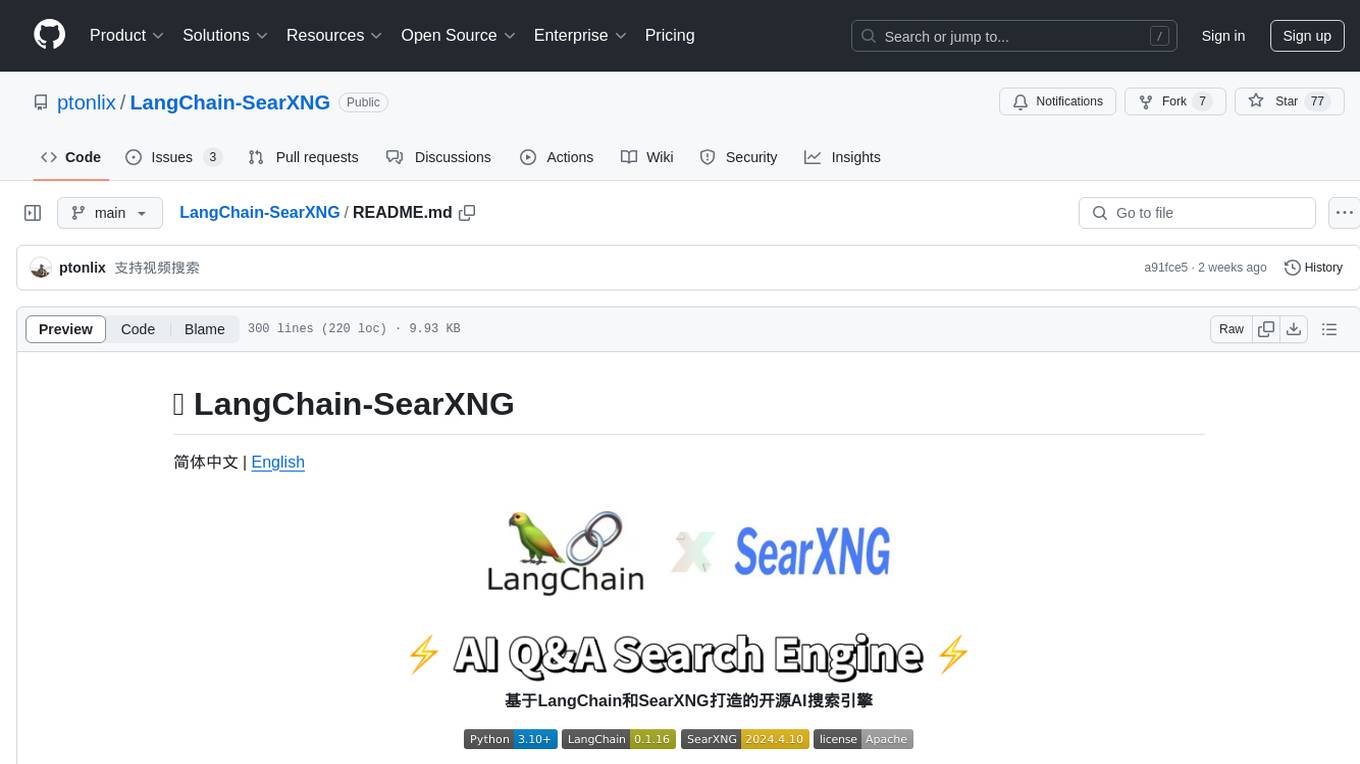
LangChain-SearXNG
LangChain-SearXNG is an open-source AI search engine built on LangChain and SearXNG. It supports faster and more accurate search and question-answering functionalities. Users can deploy SearXNG and set up Python environment to run LangChain-SearXNG. The tool integrates AI models like OpenAI and ZhipuAI for search queries. It offers two search modes: Searxng and ZhipuWebSearch, allowing users to control the search workflow based on input parameters. LangChain-SearXNG v2 version enhances response speed and content quality compared to the previous version, providing a detailed configuration guide and showcasing the effectiveness of different search modes through comparisons.
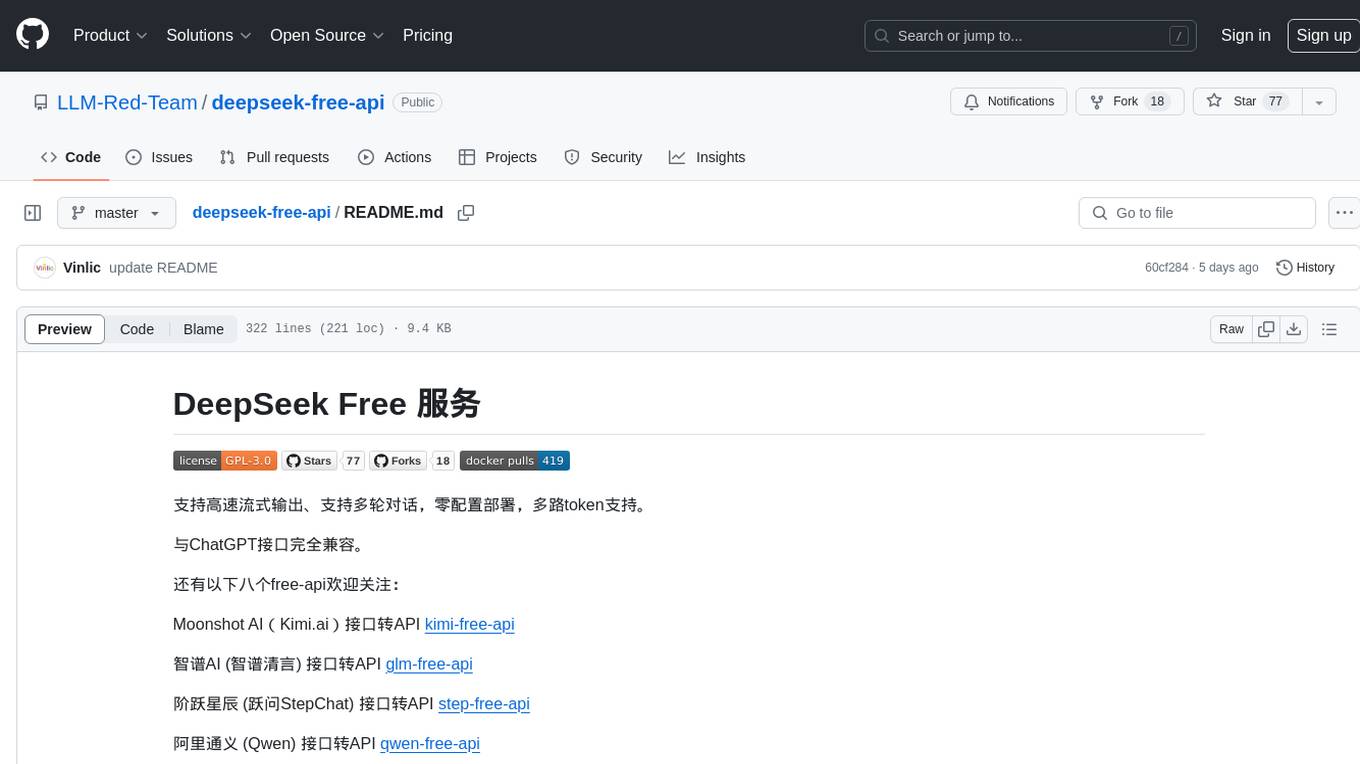
deepseek-free-api
DeepSeek Free API is a high-speed streaming output tool that supports multi-turn conversations and zero-configuration deployment. It is compatible with the ChatGPT interface and offers multiple token support. The tool provides eight free APIs for various AI interfaces. Users can access the tool online, prepare for integration, deploy using Docker, Docker-compose, Render, Vercel, or native deployment methods. It also offers client recommendations for faster integration and supports dialogue completion and userToken live checks. The tool comes with important considerations for Nginx reverse proxy optimization and token statistics.
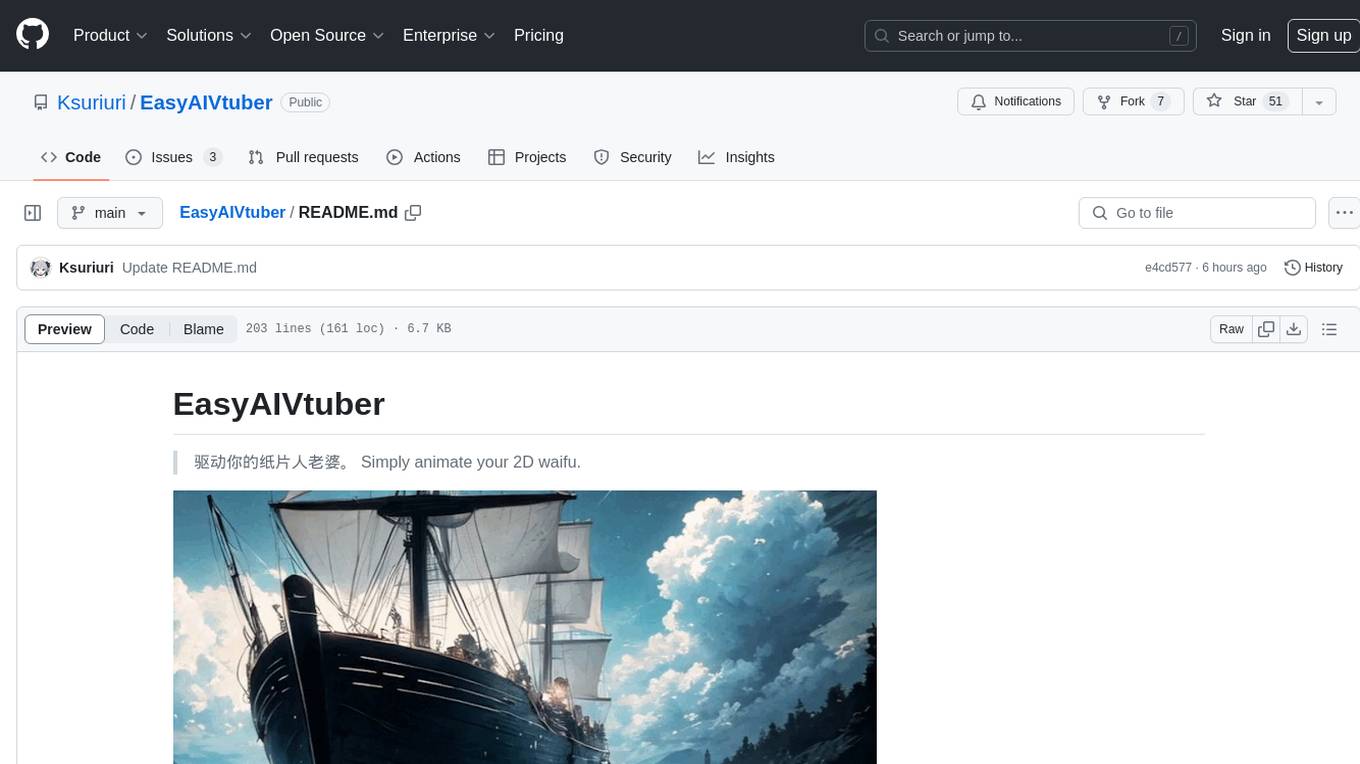
EasyAIVtuber
EasyAIVtuber is a tool designed to animate 2D waifus by providing features like automatic idle actions, speaking animations, head nodding, singing animations, and sleeping mode. It also offers API endpoints and a web UI for interaction. The tool requires dependencies like torch and pre-trained models for optimal performance. Users can easily test the tool using OBS and UnityCapture, with options to customize character input, output size, simplification level, webcam output, model selection, port configuration, sleep interval, and movement extension. The tool also provides an API using Flask for actions like speaking based on audio, rhythmic movements, singing based on music and voice, stopping current actions, and changing images.
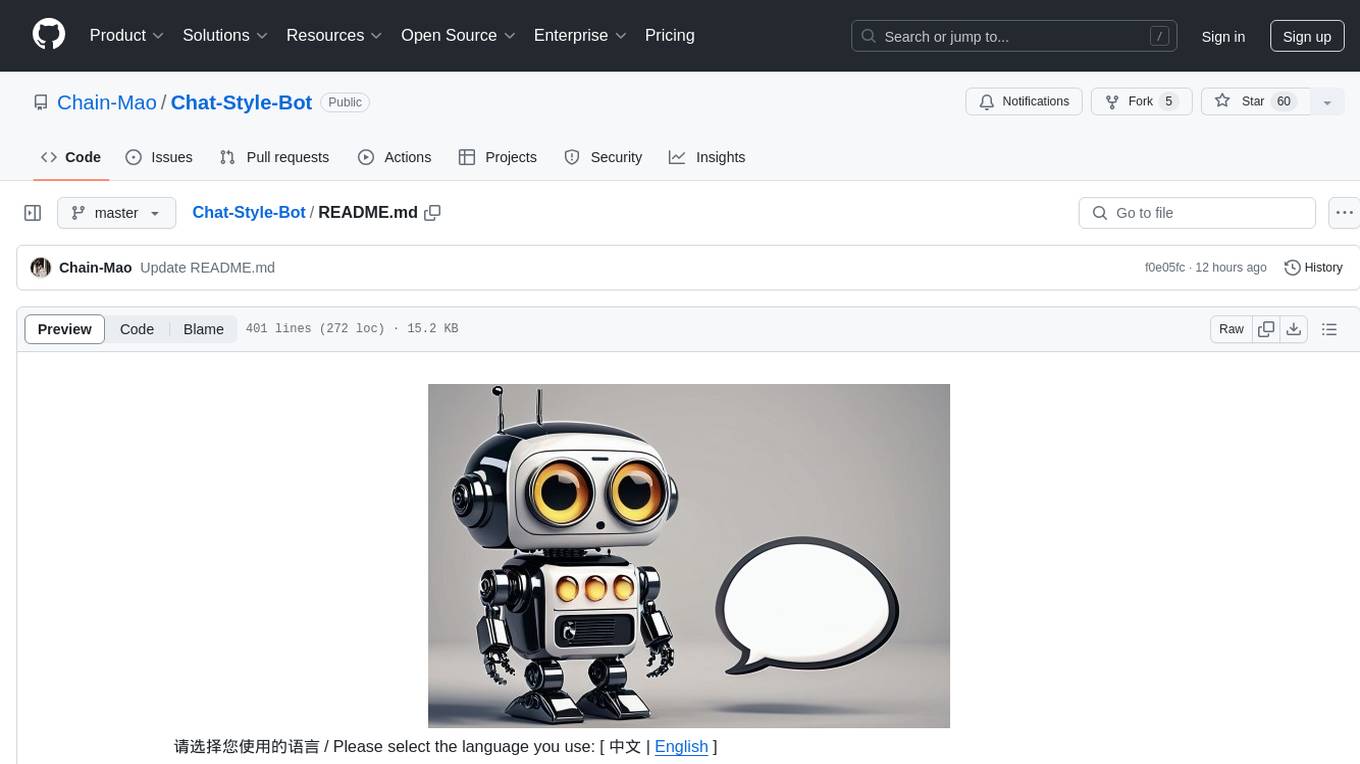
Chat-Style-Bot
Chat-Style-Bot is an intelligent chatbot designed to mimic the chatting style of a specified individual. By analyzing and learning from WeChat chat records, Chat-Style-Bot can imitate your unique chatting style and become your personal chat assistant. Whether it's communicating with friends or handling daily conversations, Chat-Style-Bot can provide a natural, personalized interactive experience.
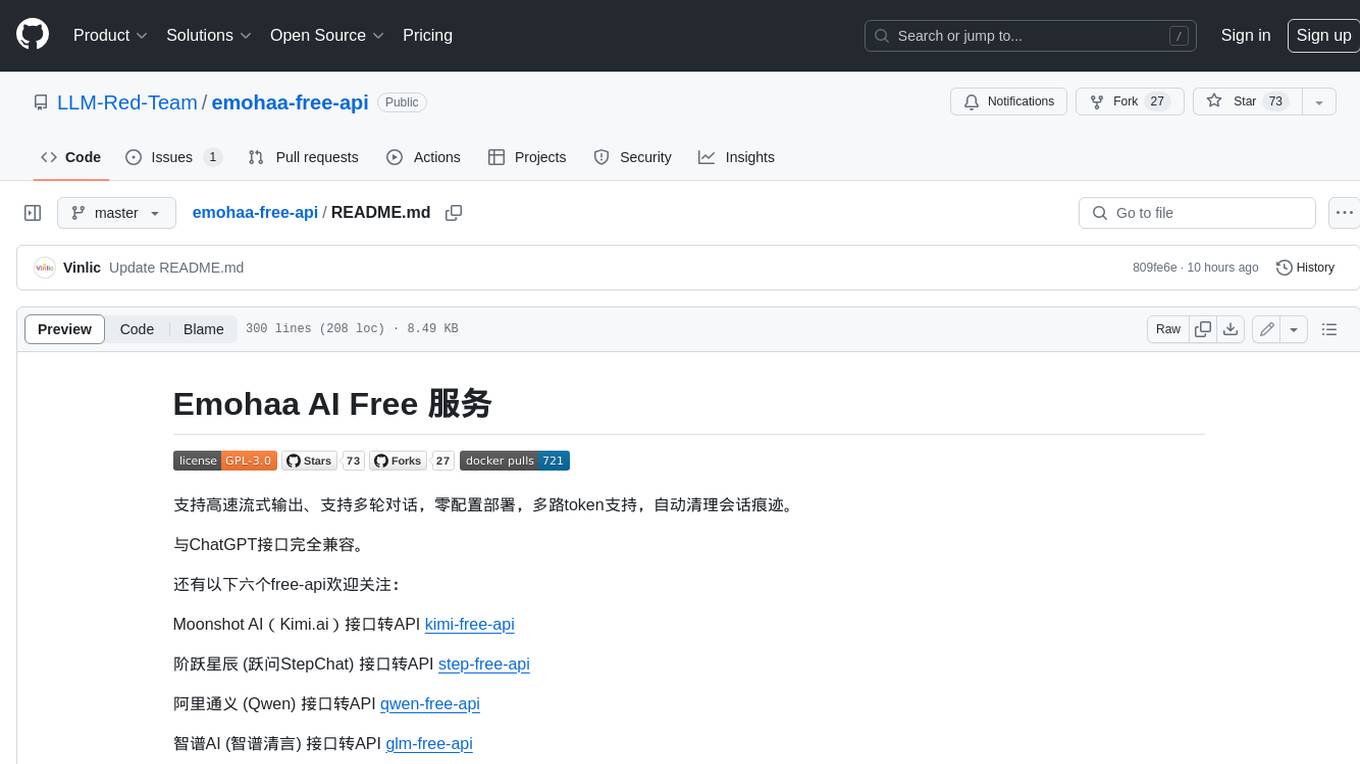
emohaa-free-api
Emohaa AI Free API is a free API that allows you to access the Emohaa AI chatbot. Emohaa AI is a powerful chatbot that can understand and respond to a wide range of natural language queries. It can be used for a variety of purposes, such as customer service, information retrieval, and language translation. The Emohaa AI Free API is easy to use and can be integrated into any application. It is a great way to add AI capabilities to your projects without having to build your own chatbot from scratch.
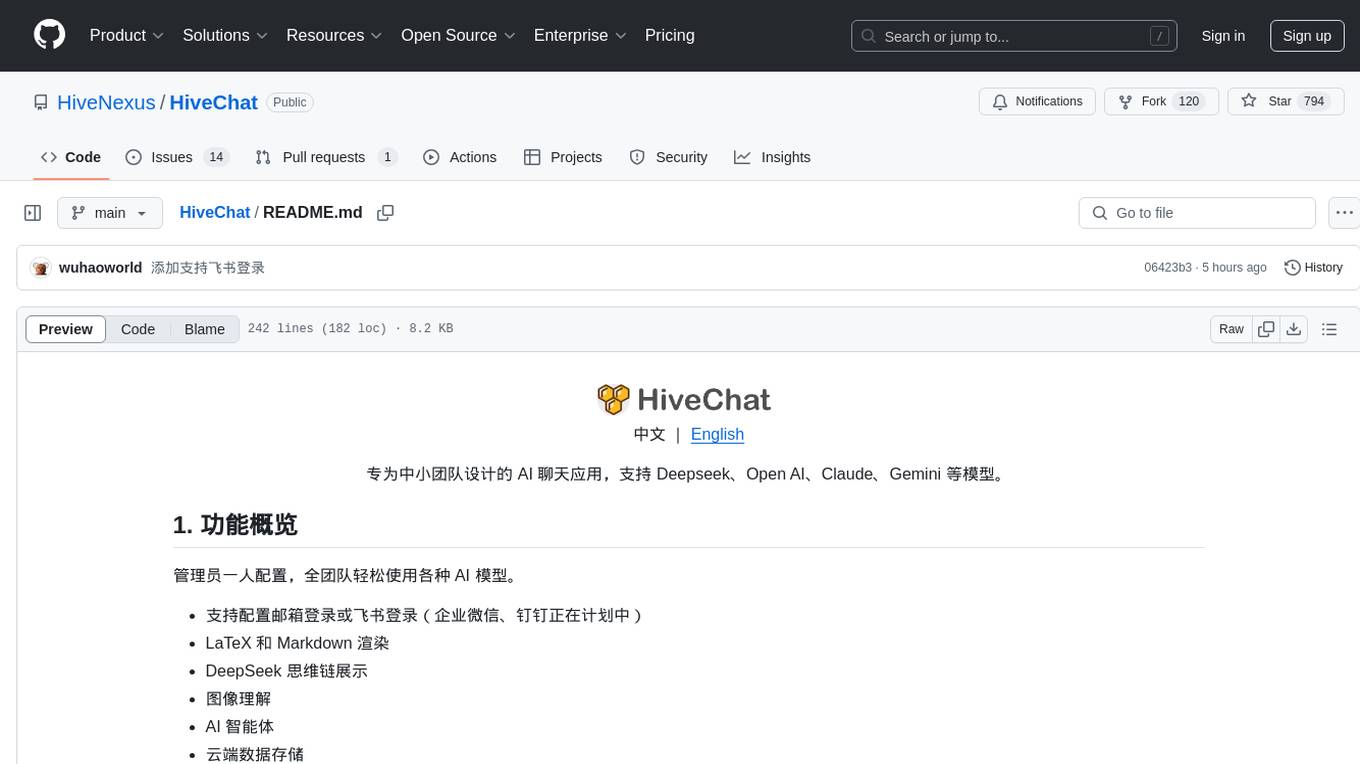
HiveChat
HiveChat is an AI chat application designed for small and medium teams. It supports various models such as DeepSeek, Open AI, Claude, and Gemini. The tool allows easy configuration by one administrator for the entire team to use different AI models. It supports features like email or Feishu login, LaTeX and Markdown rendering, DeepSeek mind map display, image understanding, AI agents, cloud data storage, and integration with multiple large model service providers. Users can engage in conversations by logging in, while administrators can configure AI service providers, manage users, and control account registration. The technology stack includes Next.js, Tailwindcss, Auth.js, PostgreSQL, Drizzle ORM, and Ant Design.
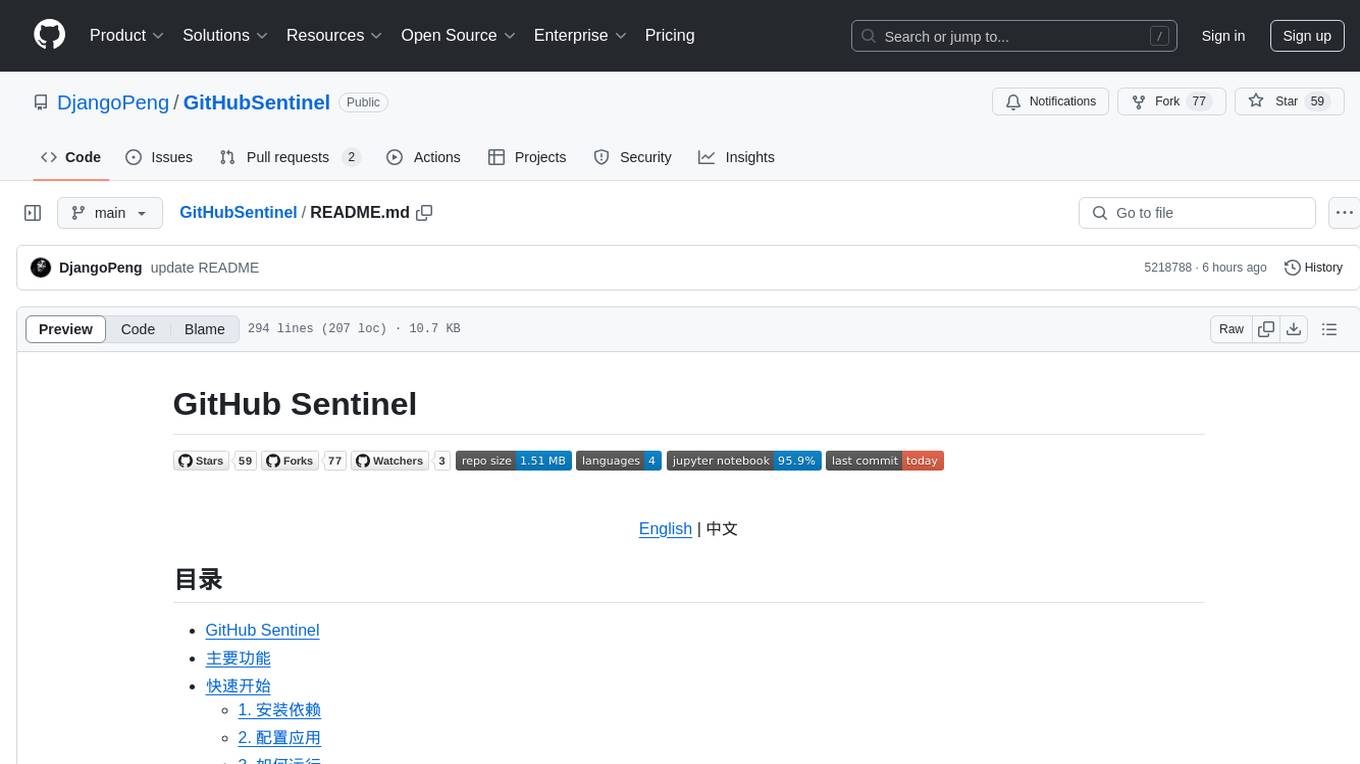
GitHubSentinel
GitHub Sentinel is an intelligent information retrieval and high-value content mining AI Agent designed for the era of large models (LLMs). It is aimed at users who need frequent and large-scale information retrieval, especially open source enthusiasts, individual developers, and investors. The main features include subscription management, update retrieval, notification system, report generation, multi-model support, scheduled tasks, graphical interface, containerization, continuous integration, and the ability to track and analyze the latest dynamics of GitHub open source projects and expand to other information channels like Hacker News for comprehensive information mining and analysis capabilities.
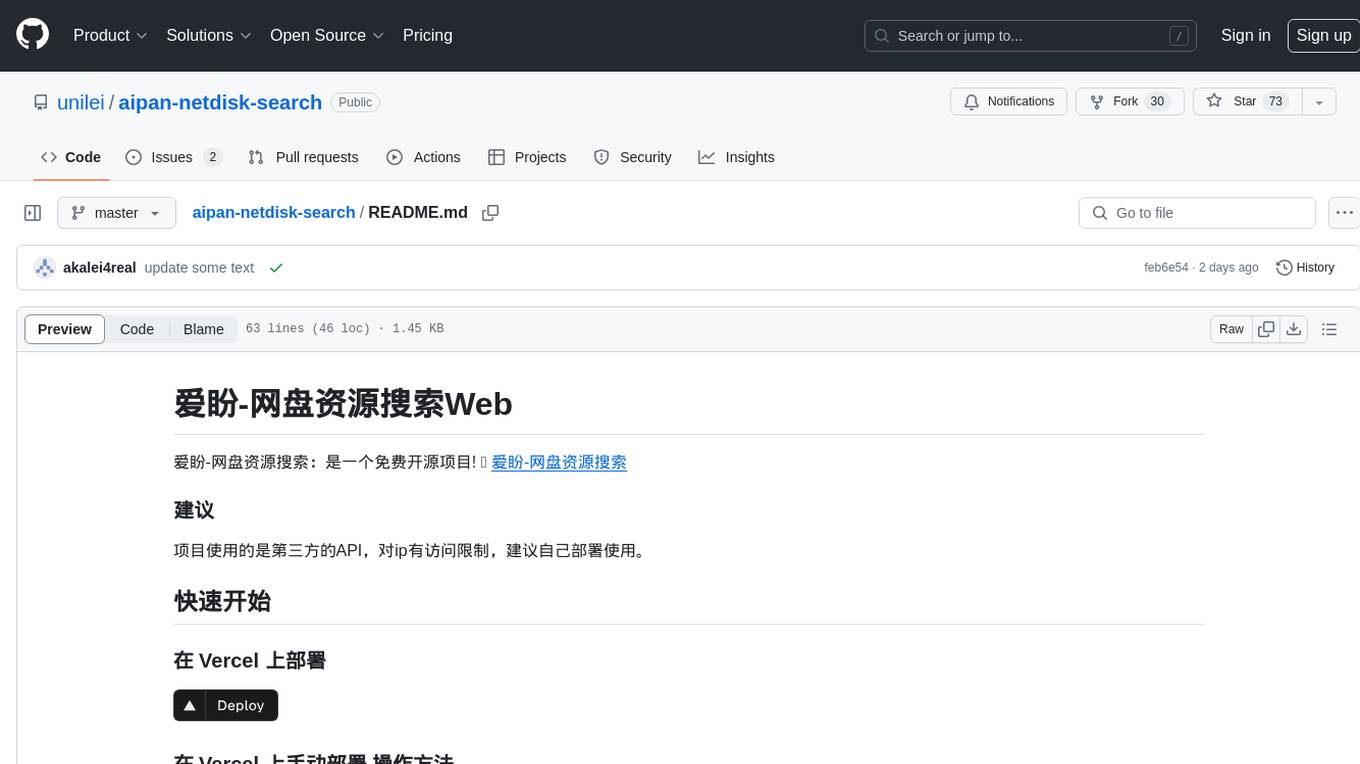
aipan-netdisk-search
Aipan-Netdisk-Search is a free and open-source web project for searching netdisk resources. It utilizes third-party APIs with IP access restrictions, suggesting self-deployment. The project can be easily deployed on Vercel and provides instructions for manual deployment. Users can clone the project, install dependencies, run it in the browser, and access it at localhost:3001. The project also includes documentation for deploying on personal servers using NUXT.JS. Additionally, there are options for donations and communication via WeChat.
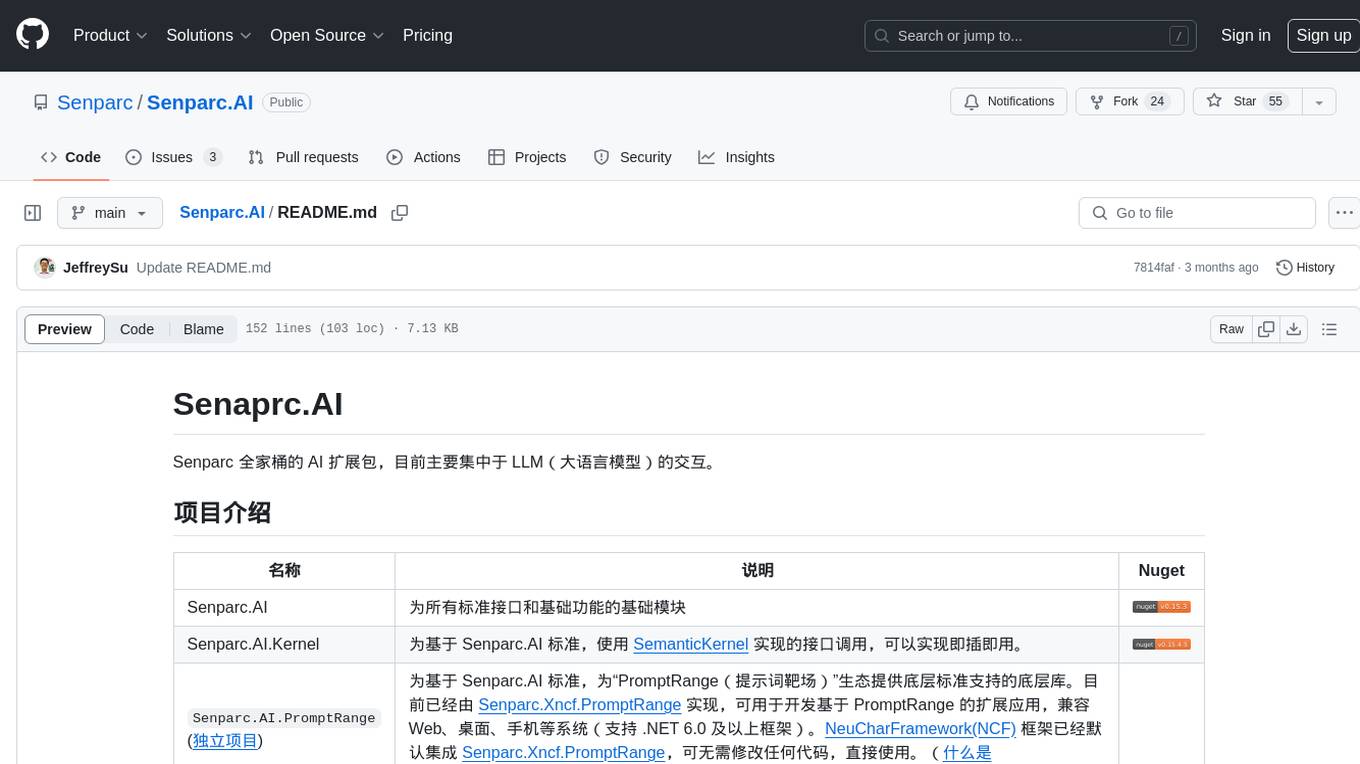
Senparc.AI
Senparc.AI is an AI extension package for the Senparc ecosystem, focusing on LLM (Large Language Models) interaction. It provides modules for standard interfaces and basic functionalities, as well as interfaces using SemanticKernel for plug-and-play capabilities. The package also includes a library for supporting the 'PromptRange' ecosystem, compatible with various systems and frameworks. Users can configure different AI platforms and models, define AI interface parameters, and run AI functions easily. The package offers examples and commands for dialogue, embedding, and DallE drawing operations.
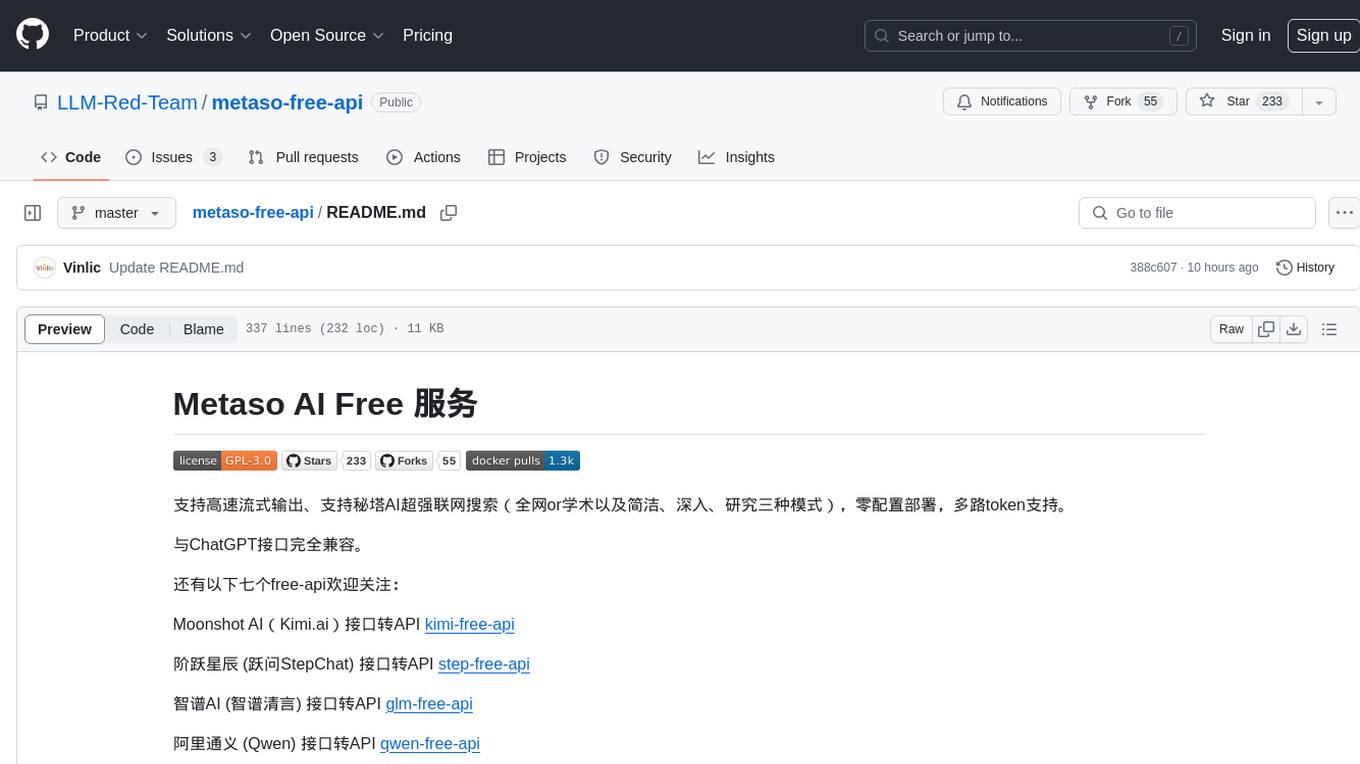
metaso-free-api
Metaso AI Free service supports high-speed streaming output, secret tower AI super network search (full network or academic as well as concise, in-depth, research three modes), zero-configuration deployment, multi-token support. Fully compatible with ChatGPT interface. It also has seven other free APIs available for use. The tool provides various deployment options such as Docker, Docker-compose, Render, Vercel, and native deployment. Users can access the tool for chat completions and token live checks. Note: Reverse API is unstable, it is recommended to use the official Metaso AI website to avoid the risk of banning. This project is for research and learning purposes only, not for commercial use.
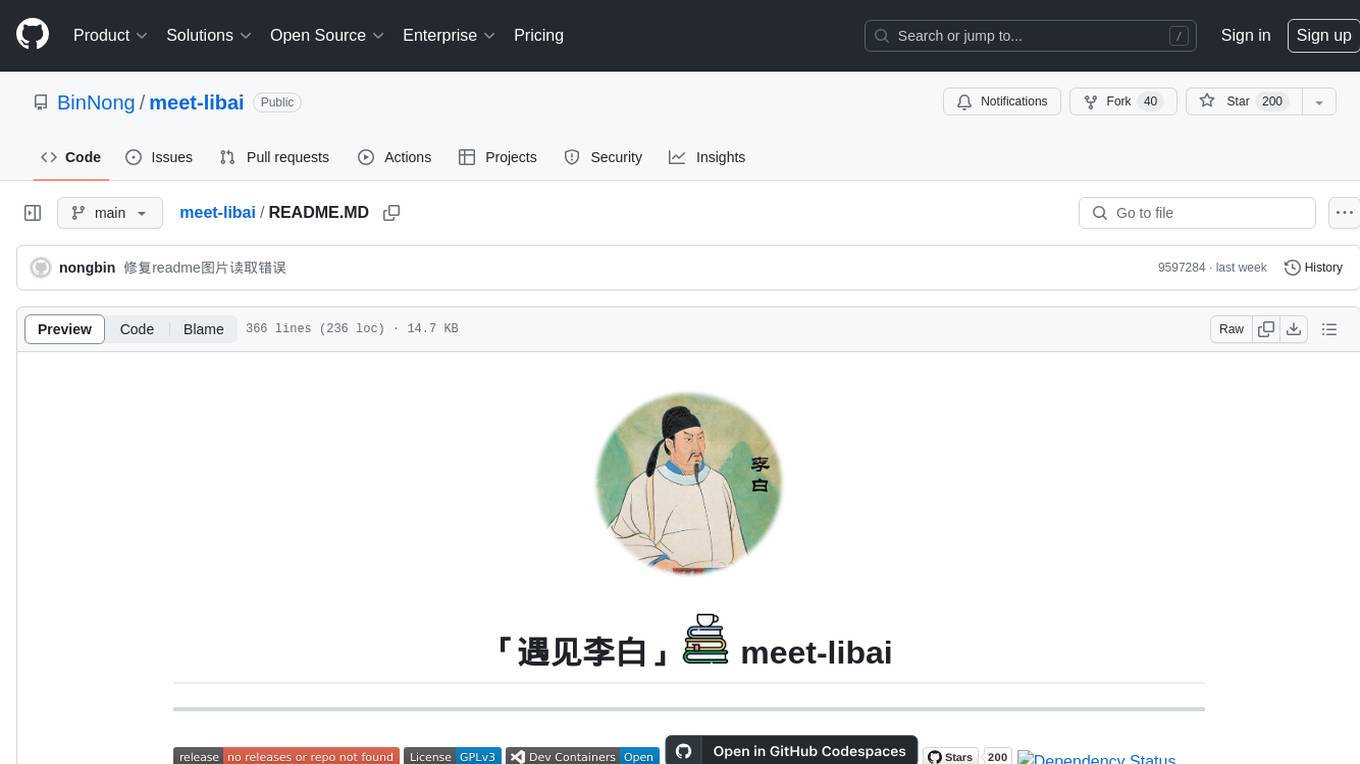
meet-libai
The 'meet-libai' project aims to promote and popularize the cultural heritage of the Chinese poet Li Bai by constructing a knowledge graph of Li Bai and training a professional AI intelligent body using large models. The project includes features such as data preprocessing, knowledge graph construction, question-answering system development, and visualization exploration of the graph structure. It also provides code implementations for large models and RAG retrieval enhancement.
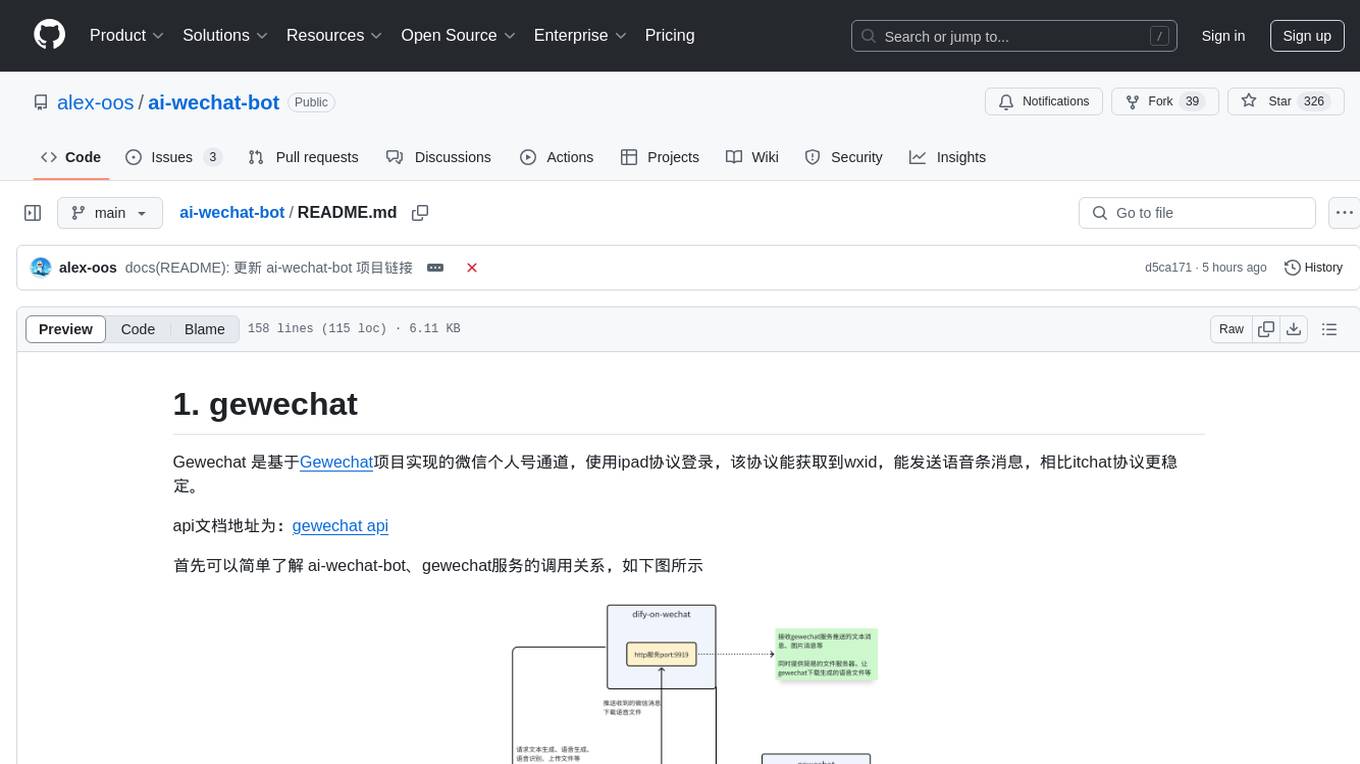
ai-wechat-bot
Gewechat is a project based on the Gewechat project to implement a personal WeChat channel, using the iPad protocol for login. It can obtain wxid and send voice messages, which is more stable than the itchat protocol. The project provides documentation for the API. Users can deploy the Gewechat service and use the ai-wechat-bot project to interface with it. Configuration parameters for Gewechat and ai-wechat-bot need to be set in the config.json file. Gewechat supports sending voice messages, with limitations on the duration of received voice messages. The project has restrictions such as requiring the server to be in the same province as the device logging into WeChat, limited file download support, and support only for text and image messages.
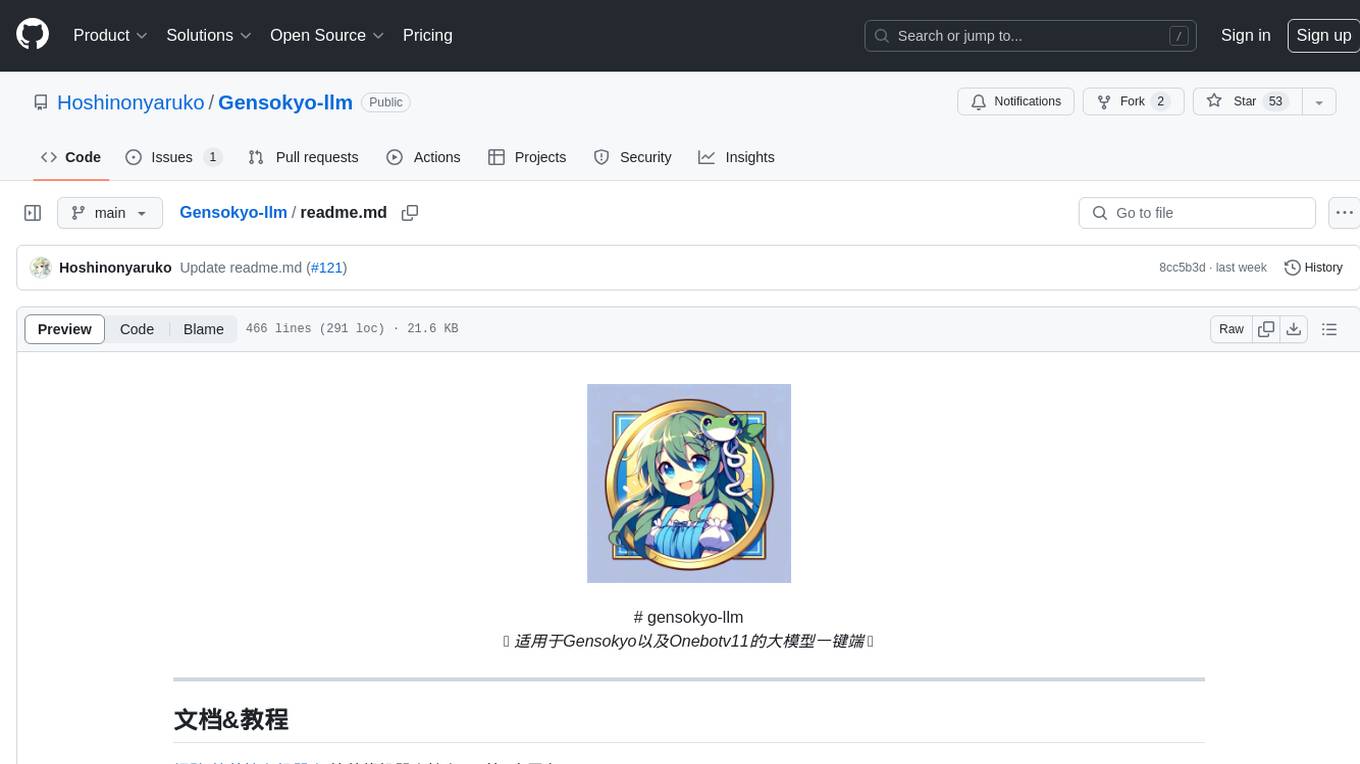
Gensokyo-llm
Gensokyo-llm is a tool designed for Gensokyo and Onebotv11, providing a one-click solution for large models. It supports various Onebotv11 standard frameworks, HTTP-API, and reverse WS. The tool is lightweight, with built-in SQLite for context maintenance and proxy support. It allows easy integration with the Gensokyo framework by configuring reverse HTTP and forward HTTP addresses. Users can set system settings, role cards, and context length. Additionally, it offers an openai original flavor API with automatic context. The tool can be used as an API or integrated with QQ channel robots. It supports converting GPT's SSE type and ensures memory safety in concurrent SSE environments. The tool also supports multiple users simultaneously transmitting SSE bidirectionally.
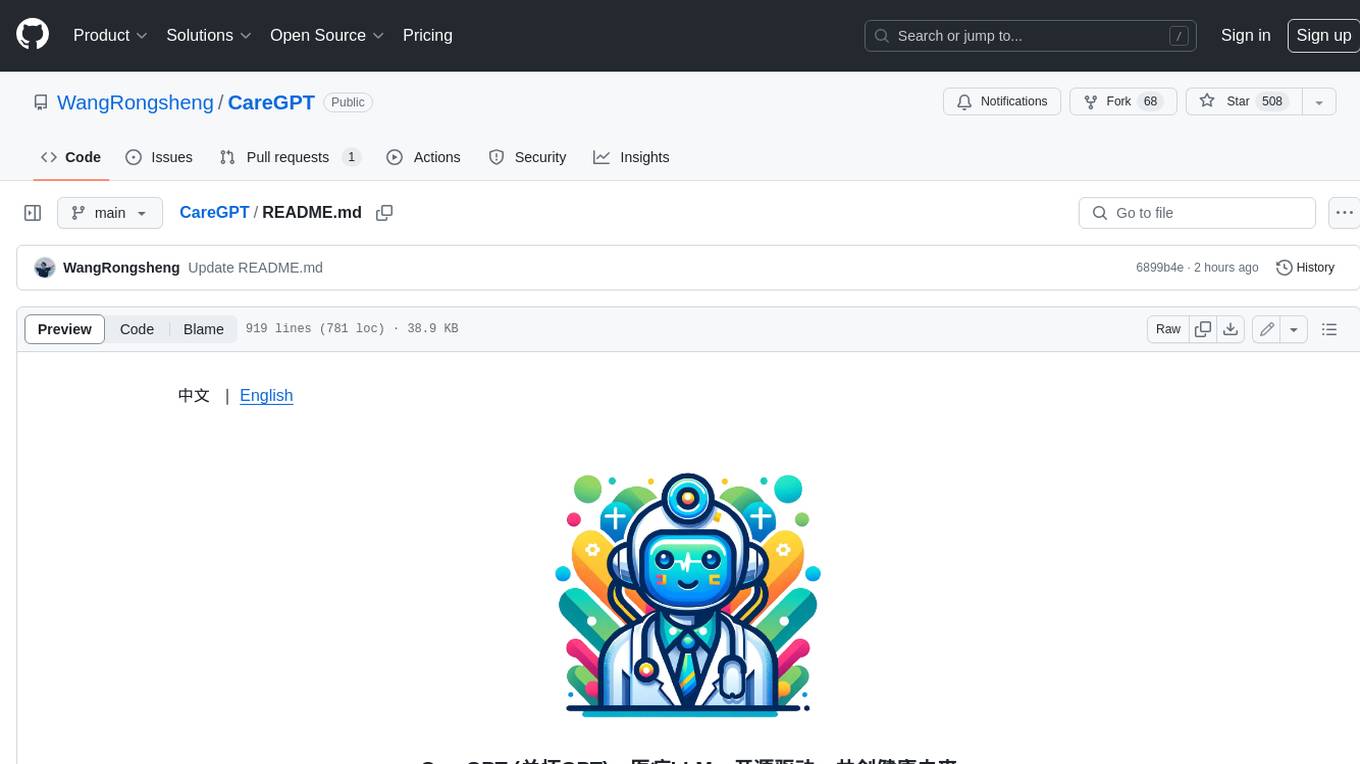
CareGPT
CareGPT is a medical large language model (LLM) that explores medical data, training, and deployment related research work. It integrates resources, open-source models, rich data, and efficient deployment methods. It supports various medical tasks, including patient diagnosis, medical dialogue, and medical knowledge integration. The model has been fine-tuned on diverse medical datasets to enhance its performance in the healthcare domain.
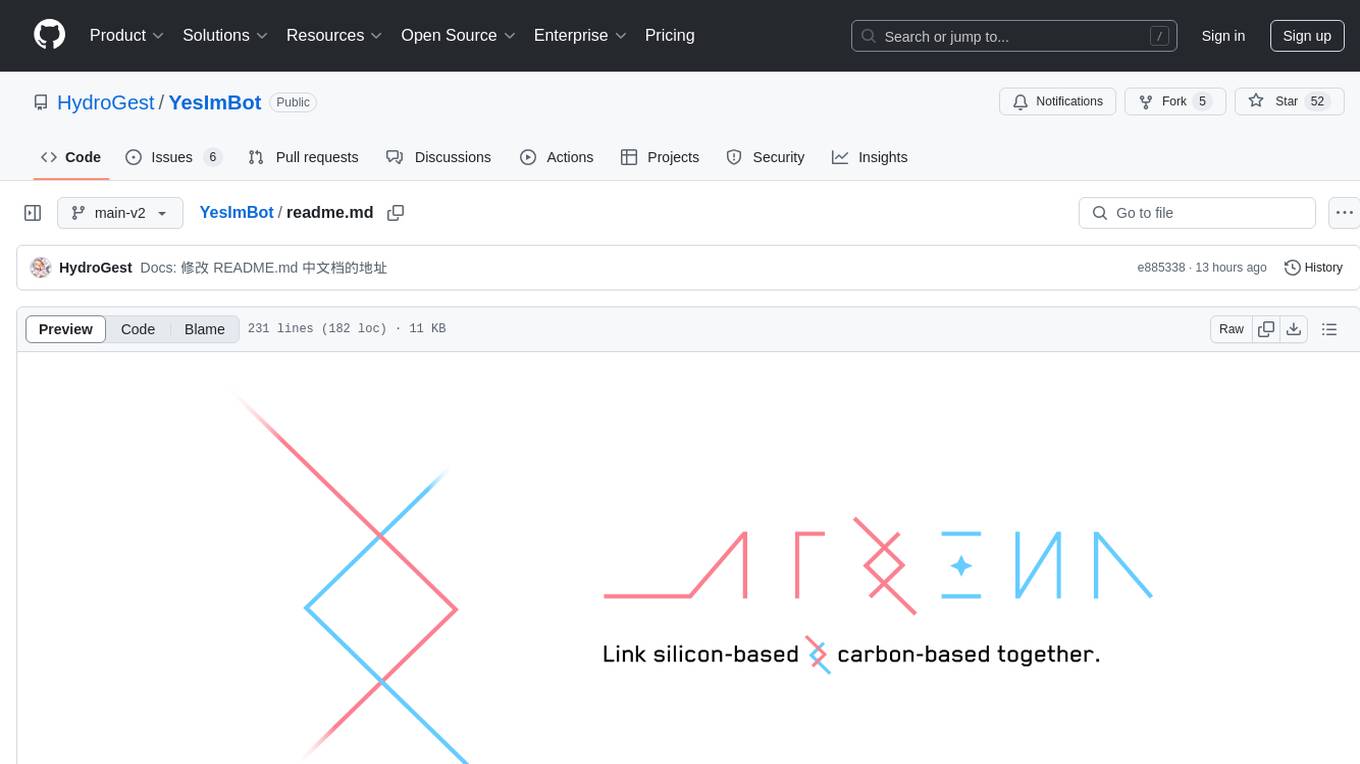
YesImBot
YesImBot, also known as Athena, is a Koishi plugin designed to allow large AI models to participate in group chat discussions. It offers easy customization of the bot's name, personality, emotions, and other messages. The plugin supports load balancing multiple API interfaces for large models, provides immersive context awareness, blocks potentially harmful messages, and automatically fetches high-quality prompts. Users can adjust various settings for the bot and customize system prompt words. The ultimate goal is to seamlessly integrate the bot into group chats without detection, with ongoing improvements and features like message recognition, emoji sending, multimodal image support, and more.
For similar tasks

LLMStack
LLMStack is a no-code platform for building generative AI agents, workflows, and chatbots. It allows users to connect their own data, internal tools, and GPT-powered models without any coding experience. LLMStack can be deployed to the cloud or on-premise and can be accessed via HTTP API or triggered from Slack or Discord.

ai-guide
This guide is dedicated to Large Language Models (LLMs) that you can run on your home computer. It assumes your PC is a lower-end, non-gaming setup.

onnxruntime-genai
ONNX Runtime Generative AI is a library that provides the generative AI loop for ONNX models, including inference with ONNX Runtime, logits processing, search and sampling, and KV cache management. Users can call a high level `generate()` method, or run each iteration of the model in a loop. It supports greedy/beam search and TopP, TopK sampling to generate token sequences, has built in logits processing like repetition penalties, and allows for easy custom scoring.

jupyter-ai
Jupyter AI connects generative AI with Jupyter notebooks. It provides a user-friendly and powerful way to explore generative AI models in notebooks and improve your productivity in JupyterLab and the Jupyter Notebook. Specifically, Jupyter AI offers: * An `%%ai` magic that turns the Jupyter notebook into a reproducible generative AI playground. This works anywhere the IPython kernel runs (JupyterLab, Jupyter Notebook, Google Colab, Kaggle, VSCode, etc.). * A native chat UI in JupyterLab that enables you to work with generative AI as a conversational assistant. * Support for a wide range of generative model providers, including AI21, Anthropic, AWS, Cohere, Gemini, Hugging Face, NVIDIA, and OpenAI. * Local model support through GPT4All, enabling use of generative AI models on consumer grade machines with ease and privacy.

khoj
Khoj is an open-source, personal AI assistant that extends your capabilities by creating always-available AI agents. You can share your notes and documents to extend your digital brain, and your AI agents have access to the internet, allowing you to incorporate real-time information. Khoj is accessible on Desktop, Emacs, Obsidian, Web, and Whatsapp, and you can share PDF, markdown, org-mode, notion files, and GitHub repositories. You'll get fast, accurate semantic search on top of your docs, and your agents can create deeply personal images and understand your speech. Khoj is self-hostable and always will be.

langchain_dart
LangChain.dart is a Dart port of the popular LangChain Python framework created by Harrison Chase. LangChain provides a set of ready-to-use components for working with language models and a standard interface for chaining them together to formulate more advanced use cases (e.g. chatbots, Q&A with RAG, agents, summarization, extraction, etc.). The components can be grouped into a few core modules: * **Model I/O:** LangChain offers a unified API for interacting with various LLM providers (e.g. OpenAI, Google, Mistral, Ollama, etc.), allowing developers to switch between them with ease. Additionally, it provides tools for managing model inputs (prompt templates and example selectors) and parsing the resulting model outputs (output parsers). * **Retrieval:** assists in loading user data (via document loaders), transforming it (with text splitters), extracting its meaning (using embedding models), storing (in vector stores) and retrieving it (through retrievers) so that it can be used to ground the model's responses (i.e. Retrieval-Augmented Generation or RAG). * **Agents:** "bots" that leverage LLMs to make informed decisions about which available tools (such as web search, calculators, database lookup, etc.) to use to accomplish the designated task. The different components can be composed together using the LangChain Expression Language (LCEL).

danswer
Danswer is an open-source Gen-AI Chat and Unified Search tool that connects to your company's docs, apps, and people. It provides a Chat interface and plugs into any LLM of your choice. Danswer can be deployed anywhere and for any scale - on a laptop, on-premise, or to cloud. Since you own the deployment, your user data and chats are fully in your own control. Danswer is MIT licensed and designed to be modular and easily extensible. The system also comes fully ready for production usage with user authentication, role management (admin/basic users), chat persistence, and a UI for configuring Personas (AI Assistants) and their Prompts. Danswer also serves as a Unified Search across all common workplace tools such as Slack, Google Drive, Confluence, etc. By combining LLMs and team specific knowledge, Danswer becomes a subject matter expert for the team. Imagine ChatGPT if it had access to your team's unique knowledge! It enables questions such as "A customer wants feature X, is this already supported?" or "Where's the pull request for feature Y?"

infinity
Infinity is an AI-native database designed for LLM applications, providing incredibly fast full-text and vector search capabilities. It supports a wide range of data types, including vectors, full-text, and structured data, and offers a fused search feature that combines multiple embeddings and full text. Infinity is easy to use, with an intuitive Python API and a single-binary architecture that simplifies deployment. It achieves high performance, with 0.1 milliseconds query latency on million-scale vector datasets and up to 15K QPS.
For similar jobs

h2ogpt
h2oGPT is an Apache V2 open-source project that allows users to query and summarize documents or chat with local private GPT LLMs. It features a private offline database of any documents (PDFs, Excel, Word, Images, Video Frames, Youtube, Audio, Code, Text, MarkDown, etc.), a persistent database (Chroma, Weaviate, or in-memory FAISS) using accurate embeddings (instructor-large, all-MiniLM-L6-v2, etc.), and efficient use of context using instruct-tuned LLMs (no need for LangChain's few-shot approach). h2oGPT also offers parallel summarization and extraction, reaching an output of 80 tokens per second with the 13B LLaMa2 model, HYDE (Hypothetical Document Embeddings) for enhanced retrieval based upon LLM responses, a variety of models supported (LLaMa2, Mistral, Falcon, Vicuna, WizardLM. With AutoGPTQ, 4-bit/8-bit, LORA, etc.), GPU support from HF and LLaMa.cpp GGML models, and CPU support using HF, LLaMa.cpp, and GPT4ALL models. Additionally, h2oGPT provides Attention Sinks for arbitrarily long generation (LLaMa-2, Mistral, MPT, Pythia, Falcon, etc.), a UI or CLI with streaming of all models, the ability to upload and view documents through the UI (control multiple collaborative or personal collections), Vision Models LLaVa, Claude-3, Gemini-Pro-Vision, GPT-4-Vision, Image Generation Stable Diffusion (sdxl-turbo, sdxl) and PlaygroundAI (playv2), Voice STT using Whisper with streaming audio conversion, Voice TTS using MIT-Licensed Microsoft Speech T5 with multiple voices and Streaming audio conversion, Voice TTS using MPL2-Licensed TTS including Voice Cloning and Streaming audio conversion, AI Assistant Voice Control Mode for hands-free control of h2oGPT chat, Bake-off UI mode against many models at the same time, Easy Download of model artifacts and control over models like LLaMa.cpp through the UI, Authentication in the UI by user/password via Native or Google OAuth, State Preservation in the UI by user/password, Linux, Docker, macOS, and Windows support, Easy Windows Installer for Windows 10 64-bit (CPU/CUDA), Easy macOS Installer for macOS (CPU/M1/M2), Inference Servers support (oLLaMa, HF TGI server, vLLM, Gradio, ExLLaMa, Replicate, OpenAI, Azure OpenAI, Anthropic), OpenAI-compliant, Server Proxy API (h2oGPT acts as drop-in-replacement to OpenAI server), Python client API (to talk to Gradio server), JSON Mode with any model via code block extraction. Also supports MistralAI JSON mode, Claude-3 via function calling with strict Schema, OpenAI via JSON mode, and vLLM via guided_json with strict Schema, Web-Search integration with Chat and Document Q/A, Agents for Search, Document Q/A, Python Code, CSV frames (Experimental, best with OpenAI currently), Evaluate performance using reward models, and Quality maintained with over 1000 unit and integration tests taking over 4 GPU-hours.

mistral.rs
Mistral.rs is a fast LLM inference platform written in Rust. We support inference on a variety of devices, quantization, and easy-to-use application with an Open-AI API compatible HTTP server and Python bindings.
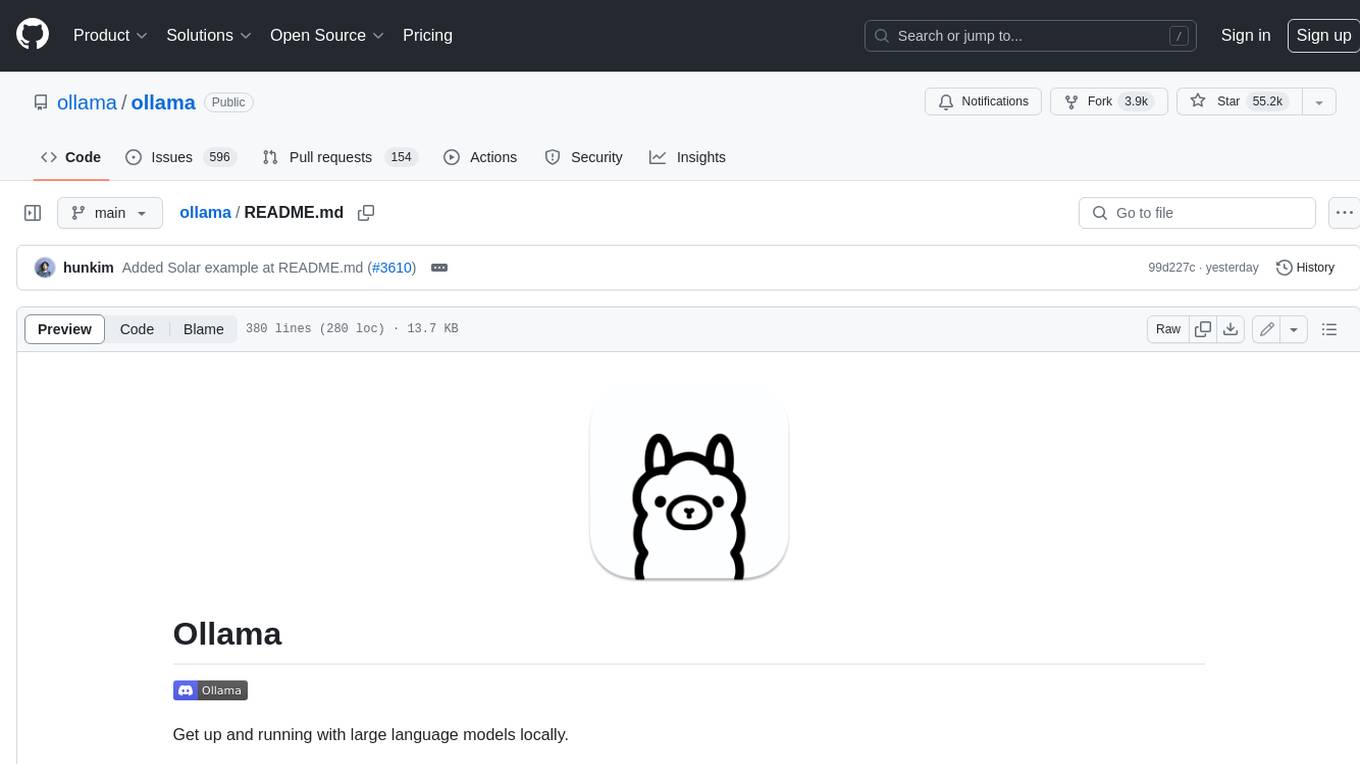
ollama
Ollama is a lightweight, extensible framework for building and running language models on the local machine. It provides a simple API for creating, running, and managing models, as well as a library of pre-built models that can be easily used in a variety of applications. Ollama is designed to be easy to use and accessible to developers of all levels. It is open source and available for free on GitHub.
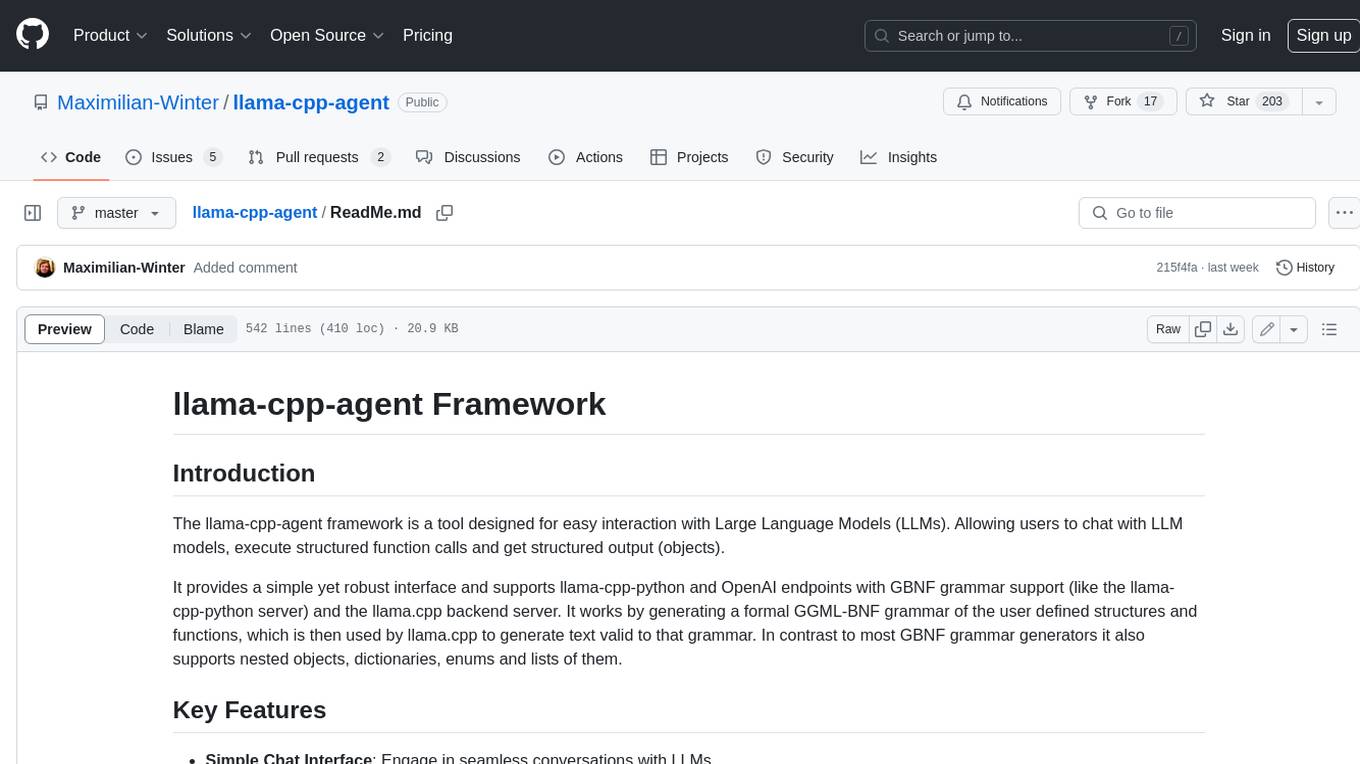
llama-cpp-agent
The llama-cpp-agent framework is a tool designed for easy interaction with Large Language Models (LLMs). Allowing users to chat with LLM models, execute structured function calls and get structured output (objects). It provides a simple yet robust interface and supports llama-cpp-python and OpenAI endpoints with GBNF grammar support (like the llama-cpp-python server) and the llama.cpp backend server. It works by generating a formal GGML-BNF grammar of the user defined structures and functions, which is then used by llama.cpp to generate text valid to that grammar. In contrast to most GBNF grammar generators it also supports nested objects, dictionaries, enums and lists of them.
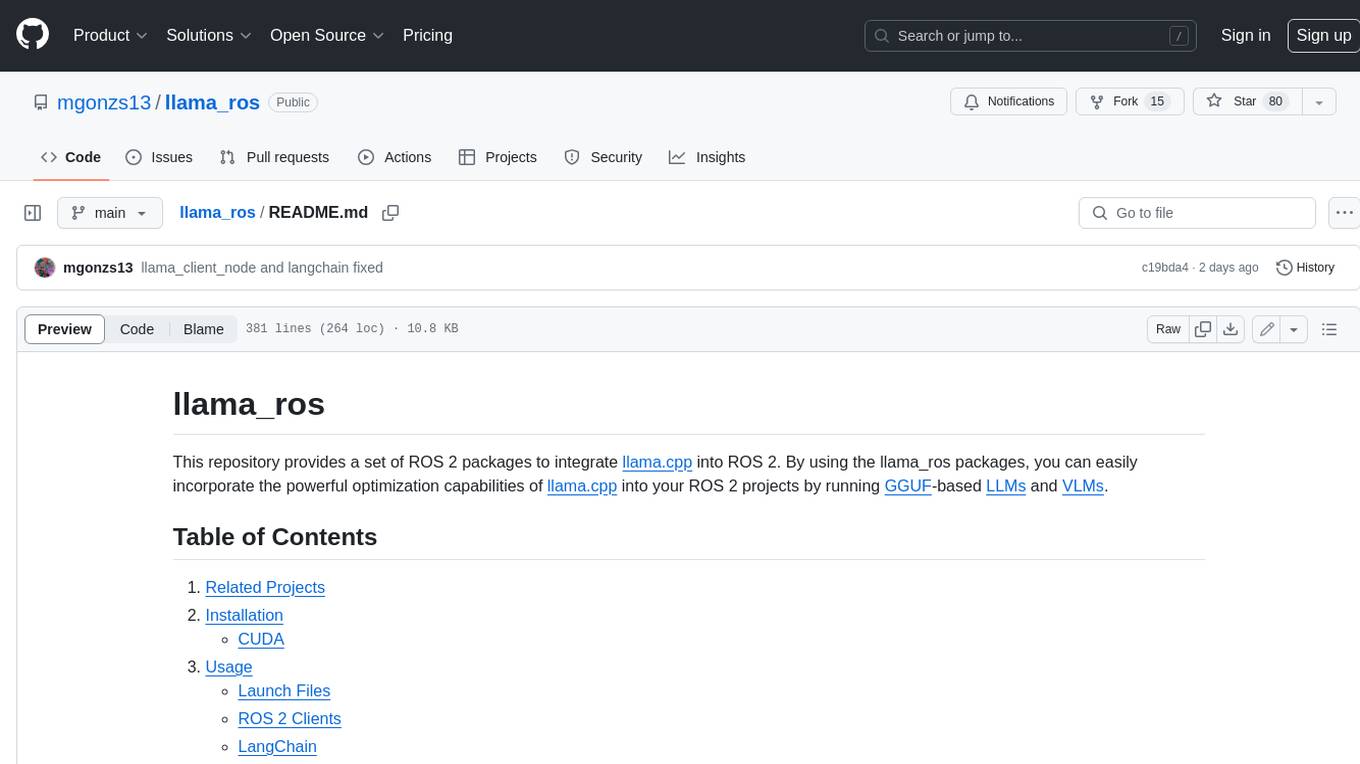
llama_ros
This repository provides a set of ROS 2 packages to integrate llama.cpp into ROS 2. By using the llama_ros packages, you can easily incorporate the powerful optimization capabilities of llama.cpp into your ROS 2 projects by running GGUF-based LLMs and VLMs.
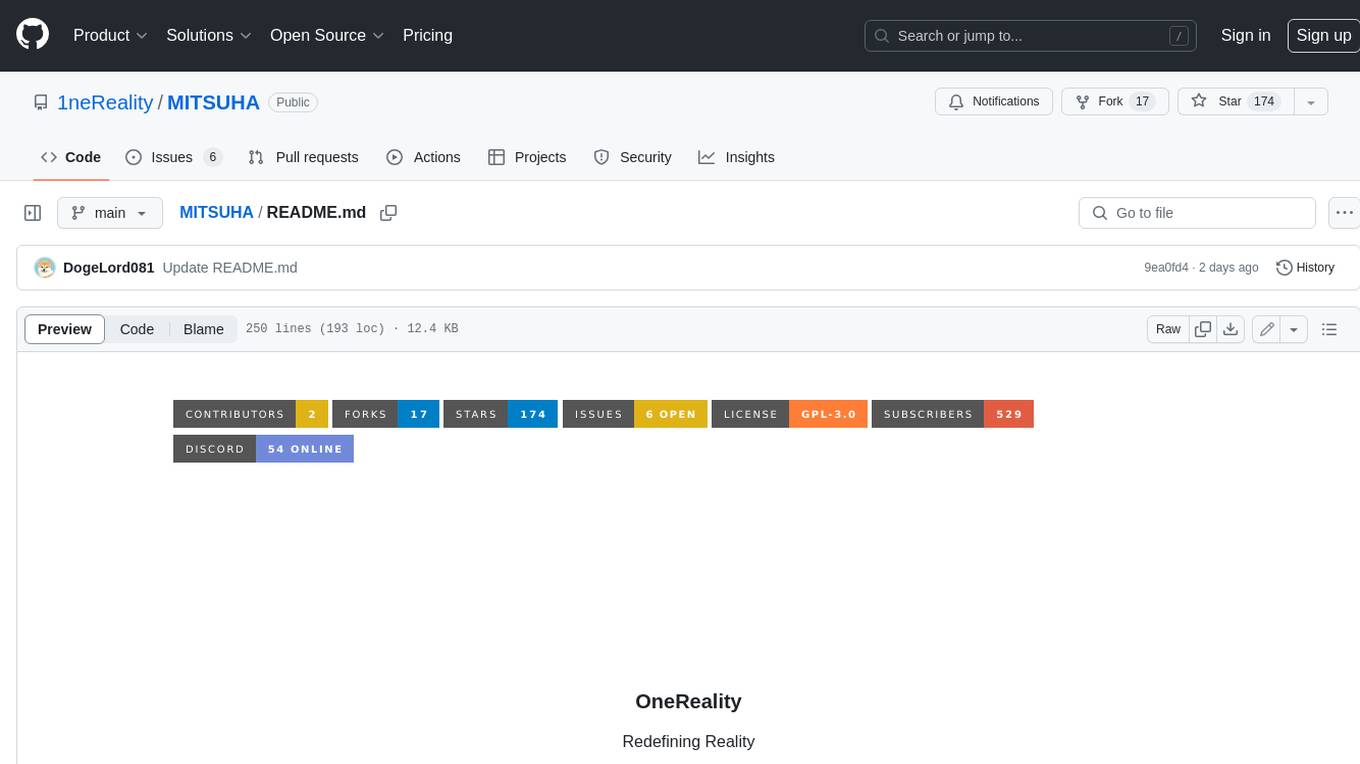
MITSUHA
OneReality is a virtual waifu/assistant that you can speak to through your mic and it'll speak back to you! It has many features such as: * You can speak to her with a mic * It can speak back to you * Has short-term memory and long-term memory * Can open apps * Smarter than you * Fluent in English, Japanese, Korean, and Chinese * Can control your smart home like Alexa if you set up Tuya (more info in Prerequisites) It is built with Python, Llama-cpp-python, Whisper, SpeechRecognition, PocketSphinx, VITS-fast-fine-tuning, VITS-simple-api, HyperDB, Sentence Transformers, and Tuya Cloud IoT.
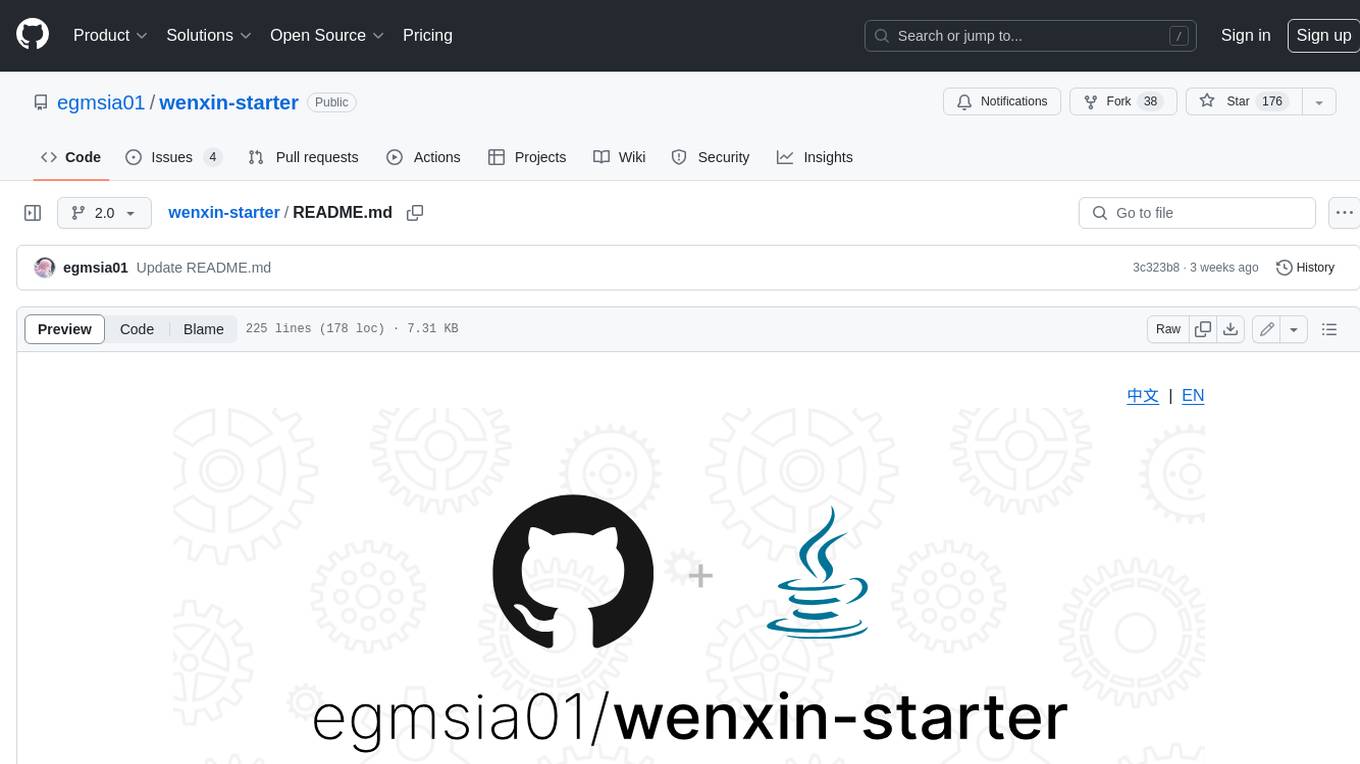
wenxin-starter
WenXin-Starter is a spring-boot-starter for Baidu's "Wenxin Qianfan WENXINWORKSHOP" large model, which can help you quickly access Baidu's AI capabilities. It fully integrates the official API documentation of Wenxin Qianfan. Supports text-to-image generation, built-in dialogue memory, and supports streaming return of dialogue. Supports QPS control of a single model and supports queuing mechanism. Plugins will be added soon.
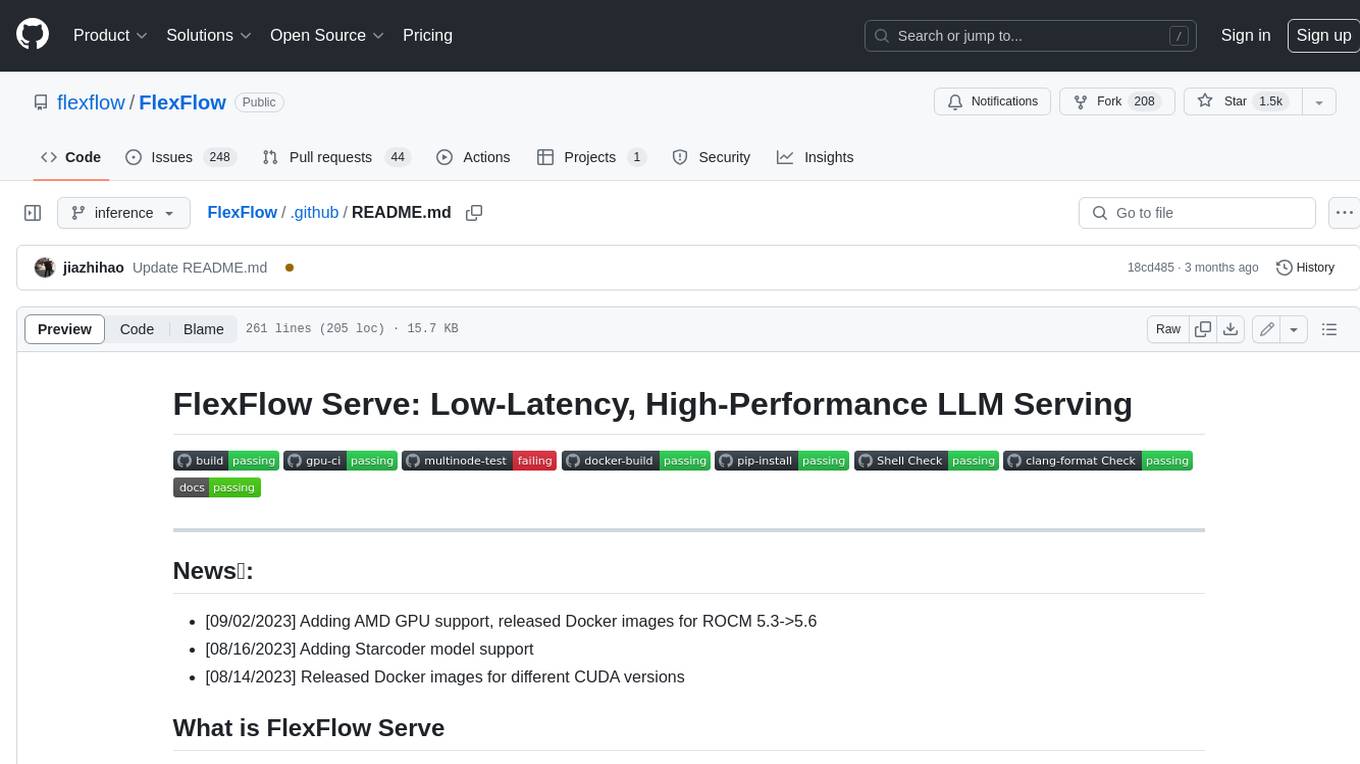
FlexFlow
FlexFlow Serve is an open-source compiler and distributed system for **low latency**, **high performance** LLM serving. FlexFlow Serve outperforms existing systems by 1.3-2.0x for single-node, multi-GPU inference and by 1.4-2.4x for multi-node, multi-GPU inference.